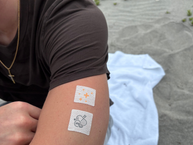Flu season officially starts in October in many places, but it really starts to hit hard in December. This year may be a particularly bad season compared to the previous two years, but there are things you can do to protect yourself against getting the flu, getting serious complications if you do get the flu, and spreading it to those you love. If your doctor agrees, Immune Supplement Patches by PatchAid can be one more weapon in your arsenal of tools against the flu.*
Getting a Flu Shot
A flu shot can lower your chance of getting the flu, and dramatically lower the chance of ending up with serious complications, such as asthma or pneumonia. They’re easy to come by, so ask your healthcare provider if you should get one and where. Often, you can choose whether to make an appointment or just walk in for your flu shot. Protection lasts for about 6 months.
Washing Hands
Washing your hands often can help prevent you from touching a contaminated surface and getting infected with the flu virus. Use soap and warm water, and scrub all surfaces of your hands for at least 20 seconds before rinsing and drying your hands on a clean towel. Hand sanitizer is an option if there is no soap and warm water available.
Wearing a Mask
They help prevent the spread of COVID-19, and they can help prevent the spread of the flu. If you’re comfortable wearing a mask, it can be a good idea when you’re around others. By now, most people have masks around their homes or know where to get them.
Keeping Your Distance
If you know people are sick, it’s a no-brainer to stay away. Staying away more often can help, too. For example, if there’s a bug going around at work, consider working from home if you can until people are back to being healthy. If you’re living with someone who has the flu, it’s good to use gloves if you have to touch them, and to eat separately from them.
Sanitizing Surfaces
The flu virus can survive on some surfaces, and sanitizing surfaces can help kill the virus. Focus on high-touch surfaces, such as doorknobs, toilet seat handles, and light switches, since these may be more likely to have and transfer virus particles to you and other people.
Eating Well
Fruits, vegetables, whole grains, and lean proteins are examples of foods that have nutrients that are essential for immunity. Choosing these types of foods can help boost your immune system. Similarly, it’s probably best to limit foods that are sugary, highly processed, or fatty if you want to do your best for your immunity.
Sleeping Enough
Sleep is good for your mind, your metabolism, your muscles, and even for your immune system. Being short on sleep is a good way to lower your immune defenses and leave you more susceptible to infections, such as the flu virus. Most adults need 7 to 9 hours of sleep per night.
These are some tips for better sleep.
- Have a consistent bedtime and waking time.
- Leave enough time for sufficient sleep each night.
- Make sure your bed is comfortable.
- Follow a regular bedtime routine.
- Avoid large meals too close to bedtime.
Managing Stress
Too much stress for too long can lead to your immune system being overextended, which puts you at risk for more infections. These are some ways to manage stress.
- Exercise regularly, as long as your doctor agrees.
- Do fun things that make you smile or laugh.
- Meditate.
- Practice gratitude.
- Visualize a happy or relaxed environment.
- Try progressive muscle relaxation.
- Use a stress management app.
Too much stress could be a sign of an imbalance, and it’s best to talk to your doctor about overwhelming stress.
Staying Home
If you’re feeling a little bit under the weather, going out might add more stress than you want to put on your body or immune system. Instead, staying home might be easier on you and give your body a chance to fight off whatever’s slowing you down.
Using Immune Defense Patches*
A boost of nutrients can help with your immune system, and Immune Defense Patches by PatchAid have a variety of essential vitamins and minerals for the immune system. These are some of our patches that may be related to immunity.*
There’s even a patch for kids, too. The Kids Multivitamin Plus with Omega-3 Topical Patch by PatchAid has nutrients that they may not be getting in large amounts from their everyday diet. It also includes omega-3 fatty acids, which are in fish and are necessary for normal health, development, and immune function.
It’s easy to use PatchAid Patches. Just peel off the backing, stick on the patch to an area of skin that’s clean and hairless, and leave it on for up to 8 hours.
There’s no need to be caught defenseless against the flu this year. With a flu shot and some other basic precautions, you can boost your chances of avoiding a serious case. Immune Defense Patches by PatchAid can be worth asking your doctor about, too.
*The Food and Drug Administration has not evaluated these statements. PatchAid patches are not intended to diagnose, treat, cure or prevent any disease. Anyone with a medical condition should seek the advice of a licensed medical practitioner. Individual results may vary.







